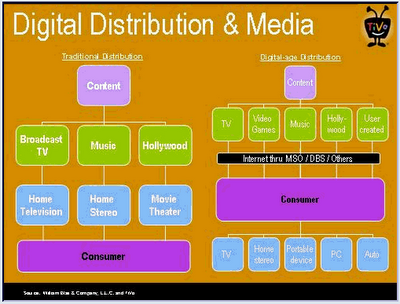Space Shifting

Remember "doing more with less"? That was the catch-phrase when, for example, state budgets crashed in the 1980s. Then there was "right-sizing" to make "down-sizing" sound so much more OK. I'm not sure who started it, but especially during the halcyon "dot.com" days, industry insiders started talking about how their companies were involved in [fill in the blank] space. Example: "As more local business information becomes readily available to online users in local search....[are searchers] comparing local options with intent to purchase (genuinely influenced by marketers operating in this space)..." (Source: http://www.clickz.com/experts/search/local_search/print.php/3615086 accessed 19 July 2006).
Well, readers, I was listening to a webcast presentation by TiVo, and learned that "space shifting" has become the catch phrase for what others might call "the television revolution." The diagram above was accessed 19 July 2006 from http://investor.tivo.com/medialist.cfm from a presentation for Deutsche Bank Media on 13 June 2006. My student readers should know that there is a wealth of information available directly from companies (oh, how I don't miss the days of getting a print copy of a company's annual report).
So, space shifting means a few things. First, in simple terms, space shifting recognizes that TV is becoming as mobile as radio. It's taken a long time, and radio had (and still will for some time) the advantage when reaching mobile listeners or the famous "listeners outside the home" where most radio listening happens anyway. If cell phones in cars can be regulated, surely it won't take much for lawmakers to ponder whether car, Hummer, and truck drivers should be watching TV or video while they drive.
TiVo is among those who are working hard to make video content available anywhere you have internet access (for example, your computer at work). Those companies that already monitor employee's email will have no trouble blocking this, but the concept is another genie out of the bottle that can't be forced back in. It's certainly not bad news for advertisers. Wherever media content goes (in the U.S. anyway), advertising is sure to follow.
You may use this content (better still, argue with me!), but please cite my ideas as © 2006, Dr. Bruce Klopfenstein. Find typos? Let me know! Best viewed in Firefox thanks to Microsoft going its own way.
 Thanks blogger community for solving my mysterious error. I'll hang on to
Thanks blogger community for solving my mysterious error. I'll hang on to 

0 Comments:
Post a Comment
<< Home